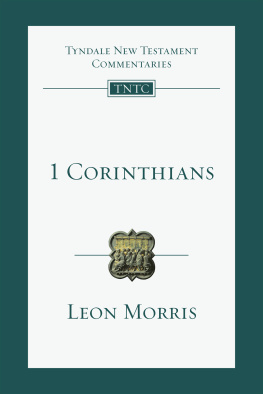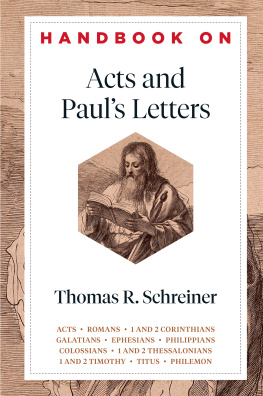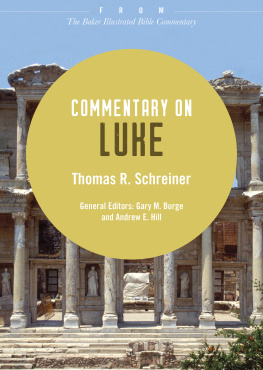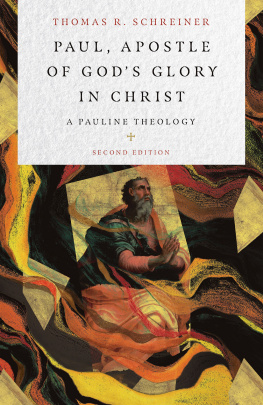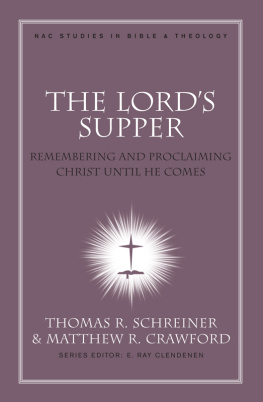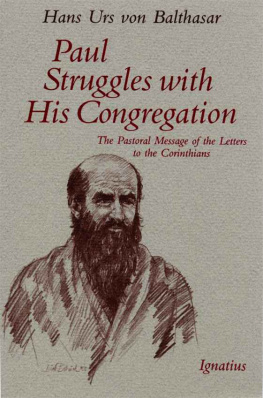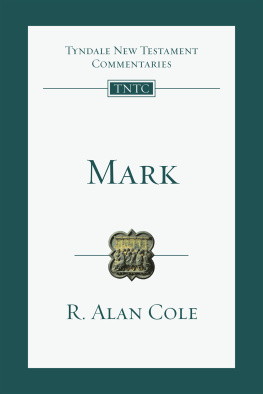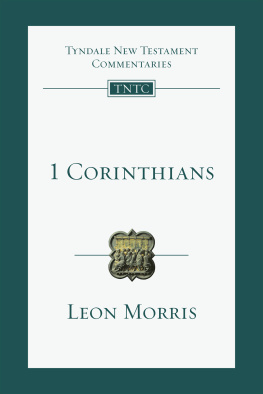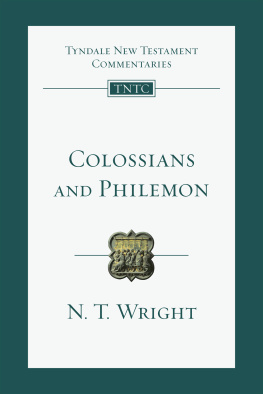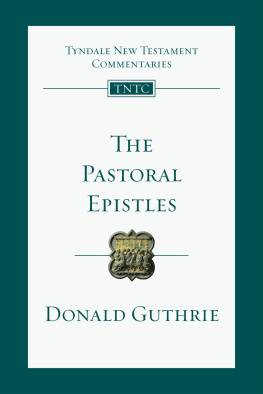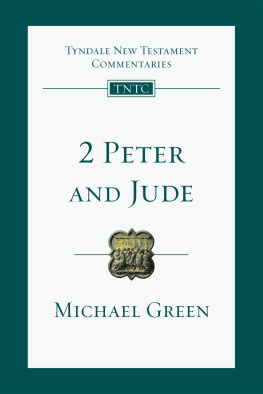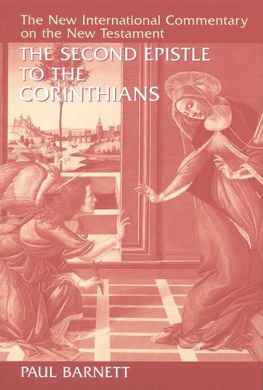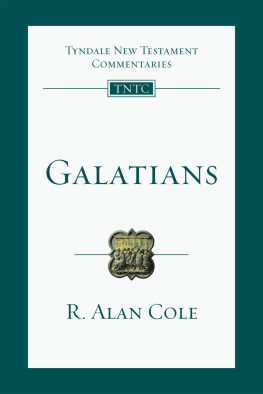TYNDALE NEW TESTAMENT
COMMENTARIES
VOLUME 7
GENERAL EDITOR: LEON MORRIS
1 CORINTHIANS
AN INTRODUCTION AND COMMENTARY
LEON MORRIS
InterVarsity Press, USA
P.O. Box 1400
Downers Grove, IL 60515-1426, USA
World Wide Web: www.ivpress.com
Email:
Leon Morris 1985
Leon Morris has asserted his right under the Copyright, Designs and Patents Act, 1988, to be identified as Author of this work.
All rights reserved. No part of this publication may be reproduced, stored in a retrieval system or transmitted in any form or by any means, electronic, mechanical, photocopying, recording or otherwise, without the prior permission of InterVarsity Press.
InterVarsity Press, USA, is the book-publishing division of InterVarsity Christian Fellowship/USA, a movement of students and faculty active on campus at hundreds of universities, colleges and schools of nursing in the United States of America, and a member movement of the International Fellowship of Evangelical Students. For information about local and regional activities, write Public Relations Dept., InterVarsity Christian Fellowship/USA, 6400 Schroeder Rd., P.O. Box 7895, Madison, WI 53707-7895, or visit the IVCF website at www.intervarsity.org.
All Scripture quotations, unless otherwise indicated, are taken from the Holy Bible, New International Version. NIV. Copyright 1973, 1978, 1984 by International Bible Society. Used by permission of Zondervan Publishing House. Distributed in the U.K. by permission of Hodder and Stoughton Ltd. All rights reserved. NIV is a registered trademark of International Bible Society. UK trademark number 1448790.
The diagrams on pp. 128, 129 and 226 are by the American School of Classical Studies, Athens, and are used by permission.
First edition 1958
Second edition 1985
ISBN 978-0-8308-9832-9 (digital)
ISBN 978-0-8308-4237-7 (print)
Any internal page references refer to page numbers in the print edition.
This digital document has been produced by Nord Compo.
TYNDALE NEW TESTAMENT
COMMENTARIES
VOLUME 7
1 CORINTHIANS
General preface
The original Tyndale Commentaries aimed at providing help for the general reader of the Bible. They concentrated on the meaning of the text without going into scholarly technicalities. They sought to avoid the extremes of being unduly technical or unhelpfully brief. Most who have used the books agree that there has been a fair measure of success in reaching that aim.
Times, however, change. A series that has served so well for so long is perhaps not quite as relevant as it was when it was first launched. New knowledge has come to light. The discussion of critical questions has moved on. Bible-reading habits have changed. When the original series was commenced it could be presumed that most readers used the Authorized Version and comments were made accordingly, but this situation no longer obtains.
The decision to revise and update the whole series was not reached lightly, but in the end it was thought that this is what is required in the present situation. There are new needs, and they will be better served by new books or by a thorough updating of the old books. The aims of the original series remain. The new commentaries are neither minuscule nor unduly long. They are exegetical rather than homiletic. They do not discuss all the critical questions, but none is written without an awareness of the problems that engage the attention of New Testament scholars. Where it is felt that formal consideration should be given to such questions, they are discussed in the Introduction and sometimes in Additional notes.
But the main thrust of these commentaries is not critical. These books are written to help the non-technical reader understand his Bible better. They do not presume a knowledge of Greek, and all Greek words discussed are transliterated; but the authors have the Greek text before them and their comments are made on the basis of what the originals say. The authors are free to choose their own modern translation, but are asked to bear in mind the variety of translations in current use.
The new series of Tyndale Commentaries goes forth, as the former series did, in the hope that God will graciously use these books to help the general reader to understand as fully and clearly as possible the meaning of the New Testament.
Leon Morris
Authors preface to the first edition
It is no new observation that the letters of St Paul are not easy reading (2 Pet. 3:15f.), but for him who is prepared to take time and trouble their study is immensely rewarding. Not least is this the case with 1 Corinthians, a letter arising out of the practical difficulties besetting a far-from-ideal first-century Greek church. Here we have a typical Pauline letter. The apostle praises his correspondents for their Christian virtues, and rebukes them roundly for their many failings. He adds to their knowledge with some great passages, notably his discussion of love in chapter 13 and of the resurrection in chapter 15. Whatever he touches he deals with in the light of great Christian principles. He sees things temporal always in the light of things eternal. What he writes has relevance to our own, in many ways very different, needs. He shows us how to take our problems back to the light shed upon them by the great Christian verities. We cannot fail to profit as we ponder his words.
In writing this commentary I have been greatly indebted to very many. Notably is this the case with regard to the commentaries to which I have referred in the notes. I have endeavoured to indicate my many indebtednesses in specific matters, but I have learned more from my predecessors than I can sufficiently acknowledge. I have also found some modern translations very helpful, for what are translations but compressed commentaries?
Finally I would like to express my gratitude to Miss G. Mahar and Miss M. McGregor who very kindly typed the manuscript for me.
Leon Morris
Authors preface to the second edition
The call for a new edition of this commentary has given me the opportunity of working through the material again, with the help of much that has been written in the years since the first edition appeared. I have been grateful for the commentaries to which I have referred, and especially to those by Barrett and Conzelmann.
The change from the Authorized Version to the New International Version as the base has meant many small alterations, and I have gone further and rewritten the whole. It is essentially the same commentary, though here and there the reader may notice a change of emphasis and even sometimes of opinion.
It may help the general reader if I point out that all cross-references have been checked against the Greek text; a reference to the English translation will not always make this clear. For example, I speak of Pauls calling himself a slave of Christ and refer to Romans 1:1.Now NIV has there a servant of Christ and the English reader may wonder a little about the accuracy of the reference. But servant translates doulos, which means slave. Despite NIV, Paul really did call himself a slave of Christ. It would have taken up a lot of space to make this sort of thing clear on every occasion, so I have often simply given the reference. But, as I have said, on every occasion the reference has been checked against the Greek.

